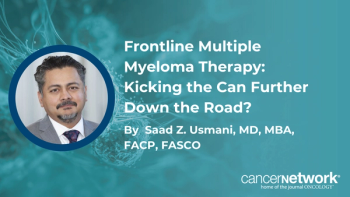
FDA Grants Priority Review to Zanubrutinib as Therapy for Pretreated Marginal Zone Lymphoma
Based on phase 1 and 2 trial results and pooled safety data from several clinical trials, zanubrutinib moves forward with a priority review in relapsed/refractory marginal zone lymphoma.
A supplemental new drug application for zanubrutinib (Brukinsa) as therapy for patients with marginal zone lymphoma (MZL) who have received 1 or more prior anti-CD20–based therapies was accepted and granted priority review by the FDA, according to the company responsible for developing the agent, Beigene, Ltd.1
The data supporting the filing come from the single-arm, open-label, multicenter, phase 2 MAGNOLIA trial (NCT03846427), which is examining the agent in patients with relapsed/refractory (R/R) MZL and is supported further by a global phase 1/2 trial (NCT02343120) in patients with B-cell malignancies.
“This is our first regulatory submission in MZL, a serious disease diagnosed in more than 2000 patients every year in the US, with no clear standard of care. In clinical trials, Brukinsa has demonstrated promising efficacy and tolerability in MZL and presents a potential new option for MZL,” Jane Huang, MD, Chief Medical Officer of Hematology at BeiGene, said in a press release. “We look forward to continuing our communications with the FDA in the coming months as we work on advancing the broad global development program for our potentially best-in-class BTK inhibitor.”
Results from the MAGNOLIA trial were previously presented at the 2020 American Society of Hematology (ASH) Annual Meeting & Exposition,2,3 demonstrating antitumor activity and tolerability in the indicated patient population (n = 68). For the primary end point, zanubrutinib resulted in a 74.2% (95% CI, 62.0%-84.2%) overall response rate (ORR), with 16 patients (24.2%) having a complete response and 33 experiencing a partial response (50.0%).
Responses were consistent across patient subgroups, including those who were 75 years and older (n = 18) at 88.9% (95% CI, 65.3%-98.6%), received 3 or more prior lines of therapy (n = 17) at 64.7% (95% CI, 38.3%-85.8%), had refractory disease (n = 21) at 71.0% (95% CI, 47.8%-88.7%), and had nodal disease (n = 25) at 84.0% (95% CI, 63.9%-95.5%). Patients maintaining their response at 6 months comprised 79.0% of the efficacy cohort.
With a median follow-up of 9.13 months, the progression-free survival rates at 6 and 9 months were 80.0% and 67.0%, respectively. Most patients were still alive at 1 year, for a 12-month overall survival rate of 94.0%.
Treatment-emergent adverse effects (TEAEs) of any-grade occurred in 95.6% of the population, with the most common events being diarrhea (20.6%), contusion (19.1%), constipation (13.2%), neutropenia (13.2%), pyrexia (11.8%), upper respiratory tract infection (11.8%), thrombocytopenia (10.3%), and nausea (10.3%). Grade 3 or greater TEAEs occurred in 38.2% of patients, with events of neutropenia (10.3%), diarrhea (2.9%), pyrexia (2.9%), thrombocytopenia (2.9%), anemia (2.9%), and pneumonia (2.9%) all occurring in at least 2 patients. Serious TEAEs were present in 32.4% of the treated population and 2 patients discontinued treatment due to some TEAE considered to be treatment-related, 1 of whom had pre-existing cardiovascular disease and experienced a fatal myocardial infraction.
The trial population included patients with extranodal, splenic, or nodal subtypes of MZL who received at least 1 prior line of CD20-directed regimen. All patients were treated with zanubrutinib 160 mg twice daily until disease progression or unacceptable toxicity.
“As demonstrated by an ORR of 74.2% and a clinical benefit rate of nearly 90% in the initial results of the MAGNOLIA trial, zanubrutinib’s strong antitumor activity could potentially benefit patients with R/R MZL, a disease with limited tolerable and effective therapeutic strategies,” Stephen Opat, FRACP, FRCPA, MBBS, Director of Clinical Hematology at Monash Health and Head of Department of Hematology at Monash University, and lead study author on the paper, said in a press release. “We were particularly excited to see that responses were generally consistent among patients with high-risk features and that zanubrutinib was generally well-tolerated.”
The FDA set a Prescription Drug User Fee Act (PDUFA) target action date for the application of September 19, 2021.
Currently, zanubrutinib is approved by the FDA as therapy for patients with mantle cell lymphoma who have received at least 1 prior therapy and is being explored across other hematologic malignancies. The safety data for the current application is also based on pooled data from 847 patients with B-cell malignancies across 7 clinical trials.
References
1. BeiGene Announces U.S. FDA Acceptance and Priority Review of Supplemental New Drug Application for BRUKINSA® (Zanubrutinib) in Marginal Zone Lymphoma. News release. BeiGene, Ltd. May 19, 2021. Accessed May 19, 2021. https://bit.ly/2RnMD1y
2. BeiGene Announces Data on BRUKINSA® (Zanubrutinib) from Phase 2 Trial in Marginal Zone Lymphoma and Phase 3 Trial in Chronic Lymphocytic Leukemia or Small Lymphocytic Lymphoma at the 62nd ASH Annual Meeting. News release. BeiGene, Ltd. December 6, 2020. Accessed May 19, 2021. https://bwnews.pr/3byV5BR
3. Opat S, Tedeschi A, Linton K, etal. Efficacy and Safety of Zanubrutinib in Patients with Relapsed/Refractory Marginal Zone Lymphoma: Initial Results of the MAGNOLIA (BGB-3111-214) Trial. Blood. 2020;136(suppl 1):28-30. doi: 10.1182/blood-2020-134611
Newsletter
Stay up to date on recent advances in the multidisciplinary approach to cancer.






































